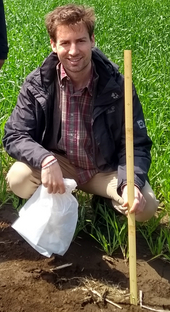Philipp Swoboda
Working Title: Rocks for crops? The agricultural usage of silicate rock powders in the context of One Health
Research Countries: Germany
Research Themes: rock fertilizer, rock weathering, soil amendment, soil health, livestock slurry, NH3, NH3 emission reduction
Abstract:
The usage of ground rocks to ameliorate soils is an ancient agricultural practice. Many rock types contain essential plant nutrients and are therefore proposed as slow-release fertilizer and soil health amendment, especially in regions where common soluble fertilizers are not affordable and easily leached out. Another potential use of rock powder is its ability to reduce ammonia (NH3) emissions from livestock slurry. Livestock keeping is currently the major source of European NH3 emissions, thereby leading to eutrophication, soil acidification and biodiversity loss. Reducing livestock keeping NH3 emissions is therefore urgently needed to maintain ecosystem health. To date however, there are no NH3 emission measurements of livestock slurry mixed with rock powders, and the overall scientific literature on rock powders in agriculture is scarce and contradictory.
The research questions are thus:
1) How and under which circumstances can rock powders improve plant growth and soil health?
2) Can rock powders reduce NH3 emissions from livestock slurry?
To answer the first question, agricultural rock powder trials will be reviewed according to their rock, soil and plant type, which are the most important factors in terms of efficiency. For the second question, slurry samples with or without rock powder additions will be placed inside sealable plastic boxes that are connected to a NH3 measuring device. The controlled measurements will be conducted in a barn at the Campus Klein-Altendorf in a randomized trial, over the course of several weeks. The expected findings comprise rock specific application recommendations for different regions and information about the NH3 reduction potential of rock powders.
Supervisor(s):
Prof. Dr. Martin Hamer (HBRS)
Prof. Dr. Thomas Döring (AOL)




